May 18, 2025 | 02:13 GMT +7
May 18, 2025 | 02:13 GMT +7
Hotline: 0913.378.918
May 18, 2025 | 02:13 GMT +7
Hotline: 0913.378.918
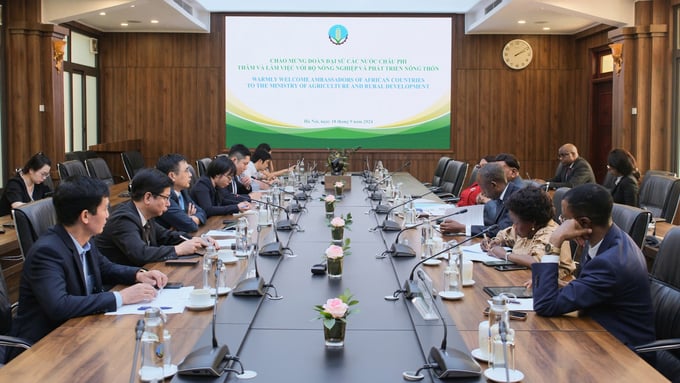
On September 18, a delegation of ambassadors from 11 African countries visited and held discussions with the Ministry of Agriculture and Rural Development (MARD). Photo: Quynh Chi.
On September 18, a delegation of ambassadors from 11 African countries visited and held discussions with the Ministry of Agriculture and Rural Development (MARD). Speaking at the meeting, Deputy Minister Nguyen Quoc Tri stated that this is an opportunity to exchange information and discuss future cooperation plans between Vietnam and Africa.
According to the Ambassador of Rwanda, the country in particular and African nations in general, place great importance on agricultural development, as the majority of their population lives and works in this sector. Additionally, during the official visit of the President of Rwanda to Vietnam in 2008, the two countries signed a Memorandum of Understanding (MOU) on cooperation in agriculture. Therefore, Rwanda hopes that Vietnam's Ministry of Agriculture and Rural Development will continue to support and promptly implement the cooperation outlined in the MOU between the two countries.
According to Ghana's Ambassador, Florence Buerki Akonor, agriculture accounts for a large portion of the country’s economy, with 60% of the workforce engaged in the agricultural sector, particularly in crop production. However, Ghana has yet to ensure food security and its agricultural sector remains rudimentary and outdated.
Specifically, Ghana consumes 1.7 million tons of rice annually but only produces 800.000 to 900.000 tons/year, with the remainder imported from Vietnam and Thailand. After the Covid-19 pandemic, Ghana recognized the urgent need for food security and the high costs associated with food imports. The Ghanaian government has since called for the development of a strategy to boost production and ensure food security. Therefore, the country hopes to receive assistance from Vietnam.
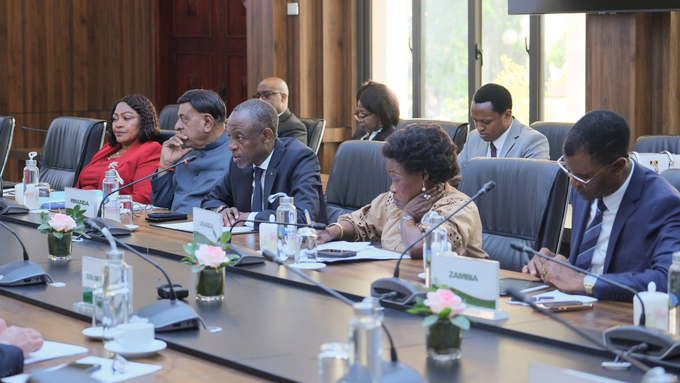
Vietnam is being regarded by African countries as a model for agricultural development. Photo: Quynh Chi.
Agreeing with the Ambassador of Ghana, Mr. Morecome Mumba, the Ambassador of Zambia, also expressed concerns about food security. Ambassador Morecome Mumba hopes to leverage the opportunity through signing an MOU to cultivate rice in both countries.
The representative from Uganda mentioned that, like other countries, 80% of Uganda's labor force is engaged in small-scale agriculture. Additionally, Uganda exports dry, unprocessed products, which results in lower value. Despite being a leading coffee exporter for over 20 years, Uganda has not achieved high value for its coffee. Therefore, Ambassador Betty Oyella Bigombe hopes that Vietnam will support Uganda in expanding agriculture, addressing climate change and providing expertise in production, thereby increasing the value of agricultural exports.
At the meeting, the Ambassador of Mauritius, Mr. Jagdishwar Goburdhun, addressed the issues of environmental pollution and climate change caused by the use of pesticides and chemical fertilizers in agriculture. Mr. Jagdishwar Goburdhun expressed his hope that Vietnam and Mauritius could collaborate on using more advanced technologies to develop agriculture, aiming to protects the environment while minimizing costs for farmers.
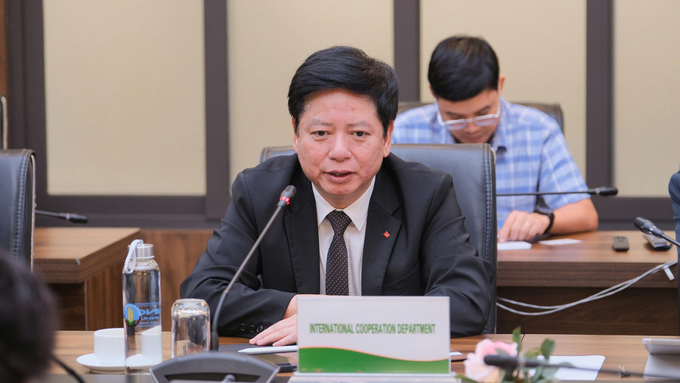
Deputy Director of the International Cooperation Department (Ministry of Agriculture and Rural Development) Pham Ngoc Mau spoke at the meeting. Photo: Quynh Chi.
Regarding agricultural cooperation, Mr. Pham Ngoc Mau, Deputy Director of the International Cooperation Department (MARD), said that Vietnam can collaborate with African countries in several ways: Coordinating the development of rice and staple crop projects; providing experts, agricultural materials, fertilizers, pesticides and post-harvest trade; offering detailed guidance and support to countries until productivity is stable and consistent. Additionally, Vietnam can assist in developing project proposals and seeking third-party funding.
In addition, the two countries could consider signing a Memorandum of Understanding (MOU) on agricultural cooperation. Once the MOU is in place, both parties will identify focal points and develop project proposals, followed by efforts to secure funding and financial resources.
Regarding organic agricultural cooperation, Vietnam is implementing the "One Million Hectares of High-Quality, Low-Emission Rice" program to fulfill the government's commitments made at COP26 and achieve Net Zero by 2050.
Regarding policy and strategy mechanisms, Mr. Tran Cong Thang, Director of the Institute of Policy and Strategy for Agriculture and Rural Development, shared some of Vietnam's experiences with the ambassadors.
According to Mr. Thang, Vietnam has made significant progress in agricultural development. To achieve these results in a short time, the Vietnamese government has focused on reforming policies, especially land policies, to incentivize farmers to invest and expand production.
Additionally, government policies prioritize investment in agriculture, particularly in irrigation systems and policies that promote domestic and international trade. Vietnam has signed numerous Free Trade Agreements (FTAs) to expand markets and create a foundation for boosting production.
Moreover, Vietnam has other policies to support producers and businesses (especially policies related to credit, taxes, irrigation and science and technology). Recently, Vietnam has entered a new phase, focusing on more intensive farming, growth based on inputs and moving towards a green, low-emission agricultural economy.
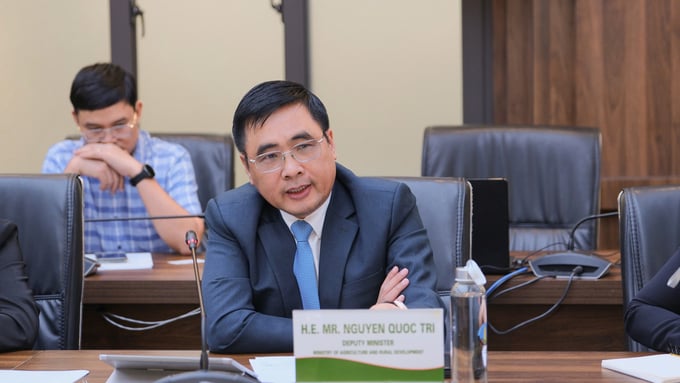
Deputy Minister of Agriculture and Rural Development Nguyen Quoc Tri affirmed that Vietnam is ready to share its lessons and experiences with African countries. Photo: Quynh Chi.
Mr. Nguyen Hong Son, Director of the Vietnam Academy of Agricultural Sciences, affirmed that Vietnam is ready to collaborate with African countries in various agricultural fields, particularly in sharing genetic resources and crop varieties.
"Vietnam has policies for training agricultural leaders and the agricultural extension staff system from central to local levels. Therefore, when new seeds and techniques are recognized and integrated into production, the extension staff will quickly transfer this knowledge to farmers for practical application. Additionally, we, along with media agencies, will actively promote these innovations for immediate implementation in production.
We are very concerned about product quality. Therefore, Vietnam has issued standards for rice, fruits and seafood to support production and ensure export quality. Regarding organic production, there are decrees and standards for organic practices in areas such as crop cultivation, livestock and aquaculture. Vietnam is also focusing on promoting circular agriculture, which helps reduce input production costs and minimizes the use of fertilizers and chemicals in agricultural production", said Mr. Hoang Van Hong, Deputy Director of the National Agricultural Extension Center.
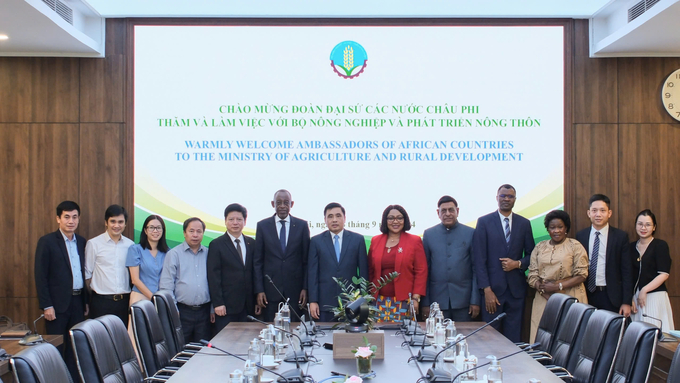
The leadership of Vietnam's Ministry of Agriculture and Rural Development and the delegation of African ambassadors pose for a commemorative photo. Photo: Quynh Chi.
At the meeting, Deputy Minister Nguyen Quoc Tri affirmed that Vietnam is ready to share its lessons and experiences with African countries. If there are other concerns, the ambassadors can contact the International Cooperation Department (MARD) to arrange specific meetings and discussions. Through this meeting, Deputy Minister Nguyen Quoc hopes that these experiences will contribute to the goals shared by the ambassadors today.
Translated by Phuong Linh

(VAN) The project contributes to enhancing the resilience of communities vulnerable to the impacts of climate change, with a primary focus on local women.
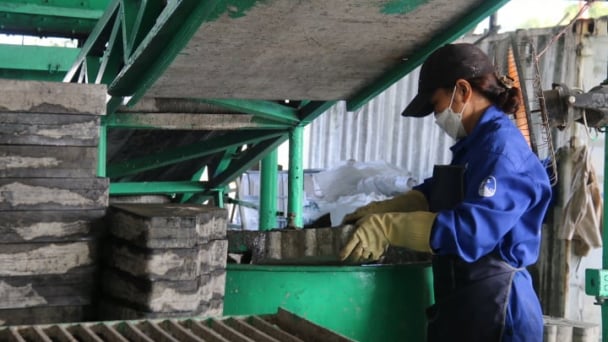
(VAN) Green materials help save energy and resources. However, after more than 10 years, Vietnam has only developed over 200 green buildings with more than 6 million square meters of floor space.
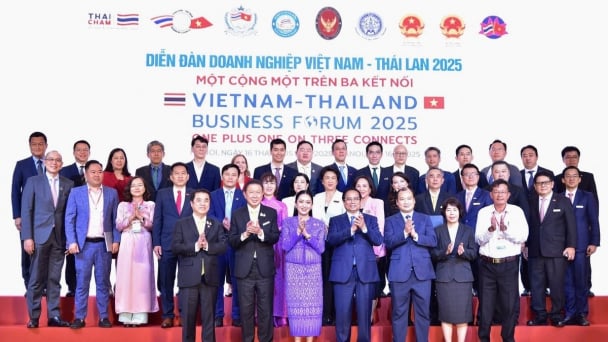
(VAN) Vietnam - Thailand Business Forum 2025: One plus one on three connects, marking a milestone in the comprehensive strategic partnership between the two nations.
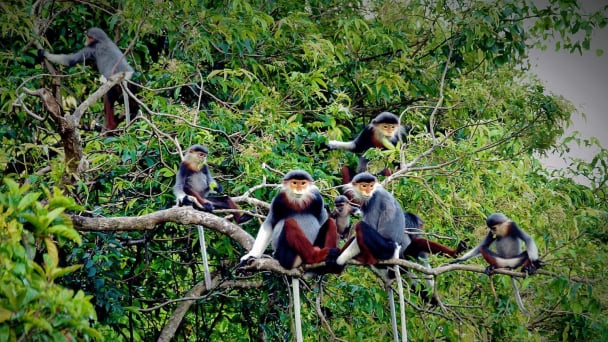
(VAN) The United Nations designated 22 May as the International Day for Biodiversity 2025 with the theme 'Harmony with nature and sustainable development.'
![Multi-channel, multi-directional Vietnamese agricultural markets: [8] A national strategy is needed](https://t.ex-cdn.com/nongnghiepmoitruong.vn/608w/files/phucpm/2025/05/15/1435-thi-truong-nong-san-viet-da-kenh-da-huongbai-8-can-mot-chien-luoc-quoc-gia-084750_728.jpg)
(VAN) The Chairman of Hung Nhon Group shared: ‘Opening up and tapping into new markets is the right and strategic direction for Vietnam's agricultural sector.’
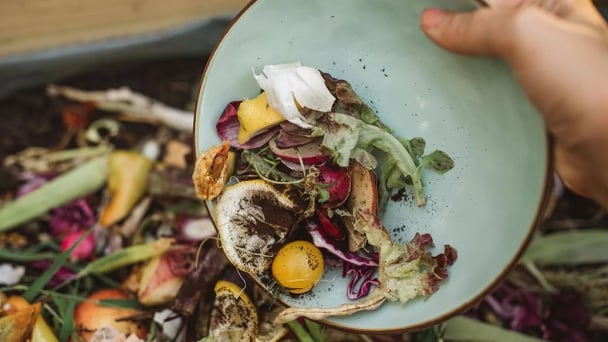
(VAN) Food waste has become a serious issue in modern society, especially in rapidly urbanizing and developing cities like Hanoi.
![Multi-channel, multi-directional Vietnamese agricultural markets: [7] Deep processing makes global reach easy](https://t.ex-cdn.com/nongnghiepmoitruong.vn/608w/files/huytd/2025/05/16/2946-che-bien-sau-chia-khoa-vang-nang-tam-nong-san-viet-tren-ban-do-the-gioi-080603_110-093858.jpg)
(VAN) The application of deep processing technology is helping Vietnamese agricultural products enhance their value, create competitive advantages, and open doors to conquer global consumers.